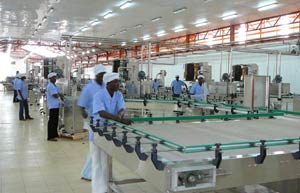Now based in Changshu, Jiangsu province, his father's Huanhai Textile Factory covers three hectares, employs 400 workers, and has five overseas offices including in Pakistan, India and Egypt, its first international venture.
Last year, total sales from all the family's businesses totaled about 40 million, with Egypt accounting for one-tenth of that.
Egyptian market regulations allow only locally made textile products to be sold, so the business in China could only export semi-manufactured goods to the country, to be made into larger items such as prayer mats and blankets.
 |
Economic growth halved, and people simply stopped buying, he said, even though his average sale price was just $6. His costs spiraled as the value of the Egyptian pound slumped and as suppliers demanded payment in dollars. Any profits evaporated.
"All these difficulties were really felt in 2012, and they created a lot of headaches for a small business like ours," Dong said.
"And as Egypt lacked foreign reserves at that time, it even became difficult for us to find dollars to pay anyone."
To make matters worse, wages then started to rise, as did tariffs on some imported goods.
In 2009, Dong was paying his workers $120 a month, but that nearly doubled. Egypt also increased its import duties on semi-manufactured goods by 20 percent.
The country had always been famous for producing quality cotton and textiles, but many of its manufacturers had failed to upgrade their equipment. Suddenly, the industry became uncompetitive as a result, despite the continued quality of its products.
But despite the growing list of problems, Dong said he is determined to continue in Egypt, and he is already seeing signs of a recovery.
The fluent English and Russian speaker said his modern factory systems have given him an edge over many competitors.
"Added to the skills I learned as a boy, I am confident I can still achieve more in Egypt," he said.
He has already started diversifying his product portfolio away from just low-end goods - some sheets and blankets he is selling are now priced at $30.
"That's a difficult transition, because in the past, many Egyptian consumers associated Chinese-made products with low quality.
"But I am already finding some customers who appreciate that China can also produce quality," Dong said.
